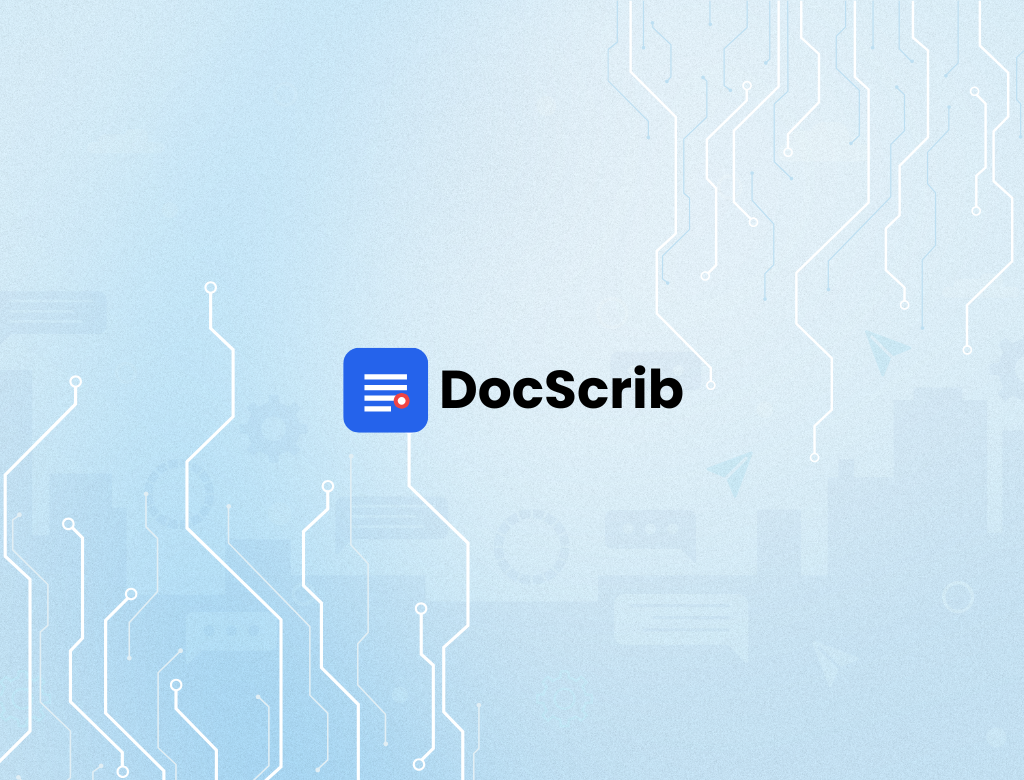In the fast-paced world of orthopedics, time is muscle—and documentation often steals that precious time. From joint injections to post-op follow-ups, orthopedists are inundated with clinical note-taking, limiting the focus on what truly matters: patient care. Enter the AI medical scribe for orthopedists—a revolutionary shift in how orthopedic practices operate.
This article explores how AI scribes like DocScrib are transforming orthopedic clinics, reducing burnout, and ensuring clinicians spend less time on charts and more time on healing.
Why Orthopedists Need an AI Medical Scribe Now More Than Ever
Orthopedic surgeons and specialists face documentation fatigue like few others in medicine:
-
High patient volume: Orthopedists often see 25–40 patients per day.
-
Complex documentation: Includes surgical history, imaging results, range of motion notes, and procedure documentation.
-
EHR overload: Manually entering notes into clunky interfaces post-visit leads to evening “pajama time” charting.
A real-time AI medical scribe like DocScrib eliminates the need to type or dictate lengthy notes, reducing administrative drag and enabling happier clinicians.
What Is an AI Medical Scribe for Orthopedists?
An AI medical scribe is a software-powered assistant that listens to doctor-patient conversations and automatically generates structured clinical documentation in real time.
For orthopedists, this means:
-
Capturing physical exam findings (e.g., “positive anterior drawer test”)
-
Documenting surgical recommendations
-
Summarizing imaging assessments (e.g., “MRI shows Grade II ACL tear”)
-
Auto-filling post-op instructions or follow-up plans
With DocScrib, the AI scribe integrates seamlessly with your workflow—no need for extra clicks or manual input.
Key Features Orthopedists Should Look for in an AI Medical Scribe
| Feature | Why It Matters in Orthopedics |
|---|---|
| Ortho-specific vocab | Recognizes terms like “crepitus,” “bunionectomy,” or “labral tear” |
| Procedure templates | Auto-generates notes for injections, arthroscopies, and joint replacements |
| EMR Integration | Syncs with EHRs like Epic, Cerner, or Athena for seamless note uploads |
| HIPAA Compliance | Ensures patient data is secure and encrypted |
| Real-Time Note Generation | Notes are ready by the time the patient leaves |
| Voice Intelligence | Captures verbal nuances and patient symptoms accurately |
DocScrib stands out by combining all of the above into one orthopedist-friendly, AI-powered scribe platform.
How DocScrib Transforms an Orthopedist’s Daily Workflow
Let’s walk through a typical day—before and after DocScrib.
Without DocScrib
-
8:00 AM: First patient
-
5:30 PM: Clinic ends
-
7:00 PM–9:00 PM: Charting, note revisions, compliance edits
With DocScrib
-
8:00 AM: First patient
-
5:30 PM: Clinic ends
-
5:31 PM: All notes completed, no after-hours work
→ 2–3 hours saved daily. Zero burnout. More time for life or surgery prep.
Real-World Use Cases of AI Medical Scribes in Orthopedic Clinics
1. Sports Medicine Practice
DocScrib listens during an exam on a meniscus injury, capturing subjective complaints, objective tests, MRI findings, and surgical counseling—all auto-documented and formatted.
2. Joint Replacement Follow-ups
Post-op notes with DocScrib include range of motion improvements, wound assessments, and mobility status without lifting a pen or tapping a keyboard.
3. Trauma Cases
High-pressure fracture evaluations are translated into precise, billable notes that meet all coding requirements.
Benefits of Using DocScrib for Orthopedists
✅ Reduce Charting Time by 85%
✅ Increase Patient Face-Time
✅ Improve Billing Accuracy
✅ Decrease Documentation Errors
✅ Avoid Burnout for Happier Clinicians
✅ Boost Clinic Throughput without Compromising Care
Orthopedists can finally focus on hands-on care, knowing that their documentation is accurate, compliant, and effortless.
The ROI of Implementing an AI Medical Scribe in Orthopedics
| Metric | Before DocScrib | After DocScrib |
|---|---|---|
| Avg. charting time/day | 2.5 hours | 15 minutes |
| Daily patients seen | 25 | 30+ |
| Billing efficiency | ~85% | ~98% |
| Work-life balance | Poor | Excellent |
The return on investment with a platform like DocScrib is tangible in both revenue and clinician wellness.
What Sets DocScrib Apart from Other Scribes?
While many AI scribes exist, DocScrib is purpose-built with features and intelligence tailored for orthopedists. Compared to others like Freed or Nabla, DocScrib offers:
-
Specialty-trained language models
-
Orthopedic coding awareness
-
Faster onboarding (under 15 minutes)
-
No human scribes = zero compliance concerns
What Orthopedists Say About DocScrib
“DocScrib cut my evening charting to zero. I finish notes between patients now. Total game changer.”
— Dr. Rajeev M., Orthopedic Surgeon
“I was skeptical at first. But the first day I left at 5:00 PM with all notes done—I was sold.”
— Dr. Anjali K., Sports Medicine Specialist
Getting Started: See DocScrib in Action
Curious if DocScrib fits your orthopedic workflow?
👉 Book a personalized demo today and experience the future of orthopedic documentation—real-time, accurate, AI-powered.
Or visit the official website: https://docscrib.com/
FAQs About AI Scribes for Orthopedics
Q1. Can DocScrib handle complex surgical notes?
Yes. DocScrib is trained on orthopedic surgical workflows and includes customizable templates.
Q2. Will it integrate with my current EHR?
DocScrib integrates with major EHRs. Custom APIs are available for clinic-specific systems.
Q3. Is patient data safe?
Absolutely. DocScrib is fully HIPAA-compliant with end-to-end encryption.
Q4. How quickly can I onboard?
Clinics are usually up and running in under a day.
Final Thoughts: AI Medical Scribes Are the Future of Orthopedic Care
Orthopedists deserve tools that match the precision and pace of their practice. With AI medical scribes for orthopedists, you’re not just saving time—you’re elevating the quality of care, reducing stress, and building a happier, more productive clinic.
DocScrib isn’t just another tech tool. It’s the partner your orthopedic team has been waiting for.
👉 Try it out. Your back—and your back office—will thank you.
